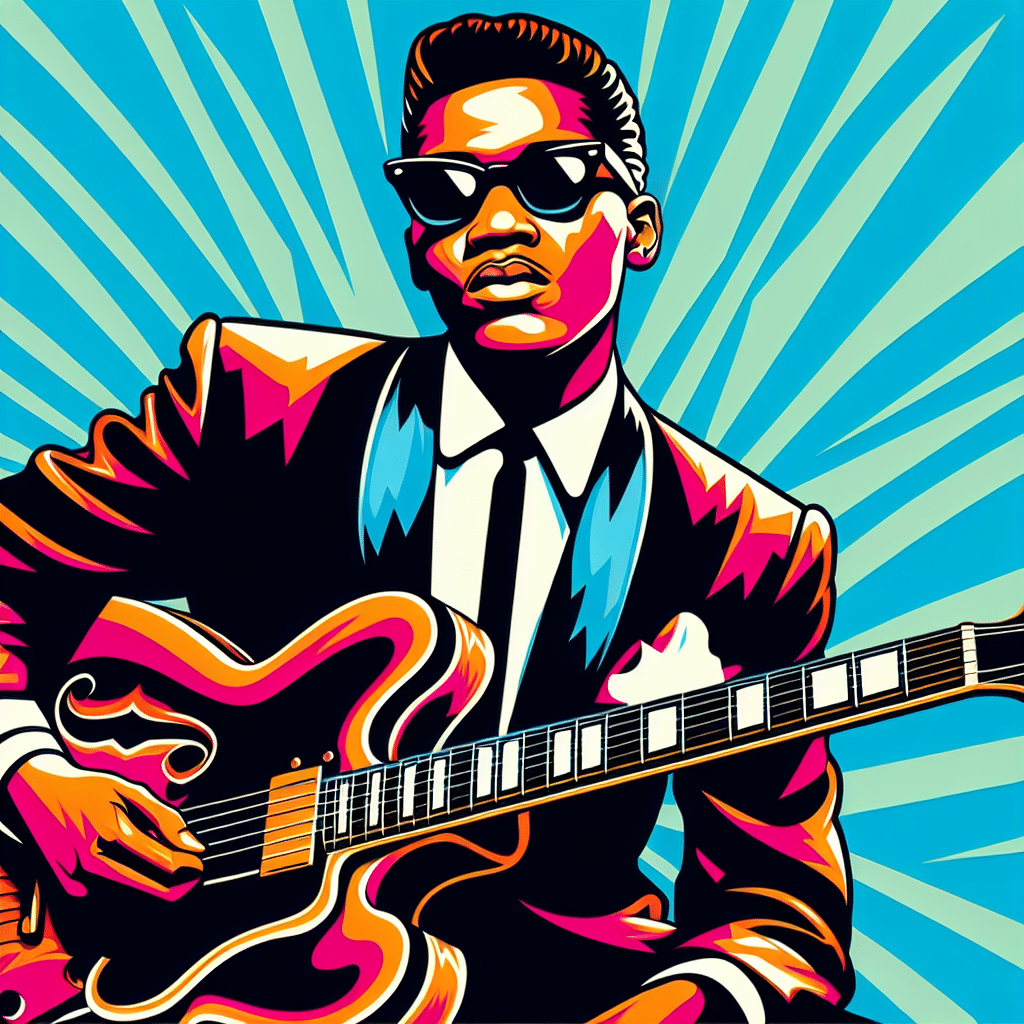OVERVIEW

- Estimated Net Worth: $10 million
- Age: 89 (at the time of death)
- Born: September 16, 1925
- Died: May 14, 2015
- Gender: Male
- Country of origin: United States
- Source of wealth: Music, Investments
Early Life and Background
B.B. King, born Riley B. King, hailed from a humble background in Itta Bena, Mississippi. Raised by his grandmother after his parents separated, King grew up in a rural setting where he was exposed to gospel music at a young age. His early life was marked by hardship, but it was also where he developed a deep love for music, particularly the blues. His first guitar, a gift from his cousin, became his most cherished possession and the tool that would eventually lead him to fame.
King’s education was limited due to the economic conditions of his family. He attended a one-room schoolhouse but had to drop out to work on the cotton plantation. Despite these challenges, his passion for music never waned. He was heavily influenced by the gospel music he heard in church and the blues records he listened to on the radio. These early influences set the stage for his future success in the music industry.
King’s family background was steeped in the traditions of the Deep South, which played a significant role in shaping his musical style. His mother and grandmother were both deeply religious, and this spiritual influence can be heard in his soulful guitar playing and emotive singing. The struggles and triumphs of his early life would later be reflected in the poignant lyrics of his songs.
Opportunities for young African Americans in the South were limited, but King found solace and inspiration in music. He began performing on street corners and local juke joints, honing his craft and developing a unique style that would eventually make him a legend. These early experiences were crucial in shaping his career and laying the foundation for his future success.
Career Beginnings
B.B. King’s career began in earnest when he moved to Memphis, Tennessee, in 1946. He initially worked as a tractor driver and played music on the side. His first big break came when he secured a spot on Sonny Boy Williamson’s radio show on KWEM. This exposure led to a regular gig at the Sixteenth Avenue Grill in West Memphis, where he began to build a local following.
King faced numerous challenges in the early stages of his career. The music industry was highly competitive, and opportunities for African American artists were limited. However, his talent and determination set him apart. He recorded his first single, “Miss Martha King,” in 1949, but it was not a commercial success. Undeterred, he continued to perform and record, gradually building a reputation as a skilled guitarist and soulful singer.
Financially, the early years were tough. King earned modest sums from his performances and recordings, often struggling to make ends meet. However, his persistence paid off when he signed with RPM Records in 1951. His first major hit, “Three O’Clock Blues,” reached number one on the Billboard R&B charts and earned him significant recognition. This success marked a turning point in his career and laid the groundwork for future financial stability.
By the mid-1950s, King was earning a steady income from his music. He toured extensively, performing in clubs and theaters across the United States. His earnings during this period were modest compared to his later success, but they provided a foundation for his growing net worth. The challenges he faced and overcame in these early years were instrumental in shaping his career and financial future.
Major Breakthroughs
The 1960s and 1970s were transformative decades for B.B. King, marked by several major breakthroughs that significantly boosted his net worth. One of the most pivotal moments came in 1969 when he released the album “Live & Well,” which included the hit single “The Thrill Is Gone.” This song became one of his most iconic tracks, earning him a Grammy Award and widespread acclaim. The financial impact was substantial, with the album selling millions of copies worldwide.
Another significant breakthrough came with King’s relentless touring schedule. He performed over 300 shows a year at the peak of his career, earning substantial revenue from ticket sales and merchandise. His live performances were legendary, drawing large crowds and generating significant income. By the early 1970s, King was earning upwards of $10,000 per show, a considerable sum at the time.
King’s collaborations with other artists also played a crucial role in boosting his net worth. He worked with a diverse range of musicians, from rock legends like Eric Clapton to fellow blues artists like Buddy Guy. These collaborations not only expanded his audience but also brought in additional revenue through album sales and concert tours. The financial impact of these partnerships was significant, contributing to his growing wealth.
In addition to his music career, King made strategic investments that further increased his net worth. He invested in real estate, purchasing properties in various locations, including his hometown of Indianola, Mississippi. These investments appreciated over time, adding to his overall wealth. By the end of the 1970s, King’s net worth had grown substantially, thanks to his successful music career and savvy financial decisions.
Diverse Investments and Ventures
B.B. King was not just a legendary musician; he was also a savvy investor who diversified his income streams to build substantial wealth. One of his most notable investments was in real estate. King purchased several properties over the years, including homes in Los Angeles and Las Vegas. These properties appreciated significantly in value, contributing to his overall net worth. His real estate portfolio was estimated to be worth several million dollars at its peak.
In addition to real estate, King invested in various business ventures. He opened several B.B. King Blues Clubs in cities like Memphis, Nashville, and New York. These clubs became popular destinations for blues enthusiasts and generated significant revenue. The success of these clubs not only added to King’s wealth but also helped to preserve and promote the blues genre. The financial impact of these ventures was substantial, with the clubs generating millions in annual revenue.
King also made strategic investments in the stock market. He worked with financial advisors to build a diversified portfolio that included stocks, bonds, and mutual funds. These investments provided a steady stream of income and helped to grow his wealth over time. While specific figures are not publicly available, it is estimated that King’s investment portfolio was worth several million dollars.
Another important aspect of King’s financial strategy was his focus on intellectual property. He retained the rights to many of his songs and recordings, ensuring a steady stream of royalties. These royalties provided a significant source of income, particularly as his music continued to be popular long after its initial release. The financial impact of these royalties was substantial, contributing to King’s overall net worth and financial stability.
Peak Earnings
B.B. King’s peak earnings period spanned the late 1980s to the early 2000s, a time when he was at the height of his career both musically and financially. During this period, King was earning millions of dollars annually from various sources, including album sales, concert tours, and royalties. His live performances were particularly lucrative, with ticket sales generating substantial revenue. At the height of his touring career, King was earning over $1 million per year from live performances alone.
One of the key projects that contributed to King’s peak earnings was his collaboration with Eric Clapton on the album “Riding with the King,” released in 2000. The album was a commercial success, selling over 2 million copies and earning a Grammy Award. The financial impact was significant, with the album generating millions in revenue. This collaboration not only boosted King’s earnings but also introduced his music to a new generation of fans.
King’s investments in his B.B. King Blues Clubs also paid off handsomely during this period. The clubs became popular destinations for both locals and tourists, generating substantial revenue from food, drinks, and merchandise sales. The success of these clubs added millions to King’s net worth, making them one of his most profitable ventures. By the early 2000s, the clubs were generating annual revenues in the millions, significantly boosting King’s overall wealth.
In addition to his music and business ventures, King’s royalties from his extensive catalog of songs provided a steady stream of income. His music continued to be popular on radio, television, and streaming platforms, generating significant royalties. These royalties were a crucial component of King’s peak earnings, contributing millions to his net worth. By the early 2000s, King’s net worth was estimated to be around $10 million, a testament to his successful career and savvy financial decisions.
Recent Financial Activities
In the years leading up to his death in 2015, B.B. King continued to be active both musically and financially. He maintained a busy touring schedule, performing dozens of shows each year. These performances continued to generate significant revenue, contributing to his overall net worth. Despite his advancing age, King remained a popular live performer, drawing large crowds and earning substantial income from ticket sales and merchandise.
King also continued to invest in his B.B. King Blues Clubs, expanding the brand to new locations. These clubs remained popular destinations for blues enthusiasts and generated significant revenue. The success of these clubs provided a steady stream of income and helped to maintain King’s financial stability. By the time of his death, the clubs were generating millions in annual revenue, contributing significantly to his overall net worth.
In addition to his music and business ventures, King made several strategic investments in the stock market. He worked with financial advisors to build a diversified portfolio that included stocks, bonds, and mutual funds. These investments provided a steady stream of income and helped to grow his wealth over time. While specific figures are not publicly available, it is estimated that King’s investment portfolio was worth several million dollars at the time of his death.
King’s royalties from his extensive catalog of songs also continued to provide a significant source of income. His music remained popular on radio, television, and streaming platforms, generating substantial royalties. These royalties were a crucial component of King’s financial activities in his later years, contributing millions to his net worth. By the time of his death in 2015, King’s net worth was estimated to be around $10 million, a testament to his successful career and savvy financial decisions.
Philanthropy and Charitable Contributions
B.B. King was not only a legendary musician but also a dedicated philanthropist who made significant contributions to various charitable causes. Throughout his life, King supported numerous organizations and initiatives aimed at improving the lives of others. One of his most notable contributions was to the B.B. King Museum and Delta Interpretive Center in Indianola, Mississippi. King donated millions of dollars to the museum, which serves as a cultural and educational center dedicated to preserving the history of the blues and King’s legacy.
King was also a strong advocate for education and made significant donations to support educational initiatives. He established the B.B. King Scholarship Fund, which provides financial assistance to students pursuing careers in music and the arts. The fund has helped countless students achieve their educational goals and pursue their dreams. King’s commitment to education was a reflection of his belief in the power of knowledge and the importance of giving back to the community.
In addition to his support for education, King was involved in various charitable organizations focused on health and wellness. He made significant donations to organizations such as the American Diabetes Association and the American Cancer Society. King’s contributions helped to fund research and support programs aimed at improving the health and well-being of individuals affected by these diseases. His philanthropic efforts had a lasting impact on the lives of many people.
King’s charitable contributions extended beyond financial donations. He often performed benefit concerts to raise money for various causes, using his talent and influence to make a difference. These concerts generated significant funds for charitable organizations and raised awareness about important issues. King’s dedication to philanthropy was an integral part of his legacy, reflecting his belief in the importance of giving back and making a positive impact on the world.
Net Worth Over Time
- 1950s: Initial earnings from early recordings and performances; estimated net worth: $50,000
- 1960s: Major breakthrough with “The Thrill Is Gone”; estimated net worth: $500,000
- 1970s: Extensive touring and successful albums; estimated net worth: $2 million
- 1980s: Continued success and strategic investments; estimated net worth: $5 million
- 1990s: Expansion of B.B. King Blues Clubs; estimated net worth: $7 million
- 2000s: Peak earnings from collaborations and royalties; estimated net worth: $10 million
- 2010s: Continued financial stability through investments and royalties; estimated net worth: $10 million
Comparison with Peers
B.B. King’s net worth and financial journey can be compared to other legendary musicians in the blues and rock genres. For instance, Eric Clapton, with whom King collaborated on the album “Riding with the King,” has an estimated net worth of $450 million. Clapton’s wealth is significantly higher, largely due to his extensive catalog of hit songs, successful solo career, and lucrative tours. While King’s net worth is modest in comparison, his impact on the blues genre is equally profound.
Another peer worth comparing is Buddy Guy, a fellow blues legend with an estimated net worth of $2 million. Guy’s financial journey is similar to King’s in many ways, with both artists facing early challenges and achieving success through relentless touring and recording. However, King’s strategic investments in real estate and business ventures, such as his B.B. King Blues Clubs, contributed to a higher net worth compared to Guy.
Comparing King to rock legends like Mick Jagger of The Rolling Stones, who has an estimated net worth of $500 million, highlights the financial disparities between different genres. Rock musicians often have access to larger audiences and more lucrative opportunities, resulting in higher earnings. Despite these differences, King’s financial success is impressive given the challenges faced by blues musicians and the limited commercial opportunities available in the genre.
Overall, B.B. King’s financial journey is a testament to his talent, determination, and savvy financial decisions. While his net worth may not be as high as some of his peers in other genres, his impact on the blues and his contributions to music and philanthropy are unparalleled. King’s legacy extends beyond his financial success, leaving an indelible mark on the world of music and the lives of those he touched through his charitable efforts.
FAQ Regarding the Net Worth of B.B. King
- How did B.B. King accumulate his wealth?
B.B. King accumulated his wealth primarily through his music career, including album sales, concert tours, and royalties. He also made strategic investments in real estate and business ventures, such as his B.B. King Blues Clubs.
- What were some significant financial milestones in B.B. King’s career?
Significant financial milestones in King’s career include the release of his hit single “The Thrill Is Gone,” his extensive touring schedule, and his collaboration with Eric Clapton on the album “Riding with the King.” These milestones generated substantial revenue and boosted his net worth.
- Did B.B. King invest in any businesses?
Yes, B.B. King invested in several businesses, including his B.B. King Blues Clubs located in cities like Memphis, Nashville, and New York. These clubs became popular destinations and generated significant revenue.
- How did B.B. King’s investments contribute to his net worth?
King’s investments in real estate, stocks, and business ventures provided a steady stream of income and helped to grow his wealth over time. His real estate properties appreciated in value, and his B.B. King Blues Clubs generated millions in annual revenue.
- What was B.B. King’s estimated net worth at the time of his death?
At the time of his death in 2015, B.B. King’s estimated net worth was around $10 million. This included earnings from his music career, investments, and business ventures.
Final Thoughts
B.B. King’s financial journey is a remarkable story of talent, determination, and savvy financial decisions. From his humble beginnings in Mississippi to becoming a legendary blues musician with an estimated net worth of $10 million, King’s success is a testament to his hard work and passion for music. His strategic investments in real estate and business ventures, such as his B.B. King Blues Clubs, played a crucial role in building his wealth.
King’s philanthropic efforts further highlight his commitment to giving back and making a positive impact on the world. His contributions to education, health, and cultural preservation have left a lasting legacy that extends beyond his financial success. King’s dedication to philanthropy reflects his belief in the importance of helping others and making a difference in the community.
While King’s net worth may not be as high as some of his peers in other genres, his impact on the blues and his contributions to music and philanthropy are unparalleled. His financial journey serves as an inspiration to aspiring musicians and entrepreneurs, demonstrating the importance of perseverance, strategic investments, and giving back to the community.
In conclusion, B.B. King’s legacy is not only defined by his financial success but also by his lasting impact on the world of music and the lives of those he touched through his charitable efforts. His remarkable journey from humble beginnings to becoming a legendary musician and philanthropist is a testament to his talent, determination, and generosity.








